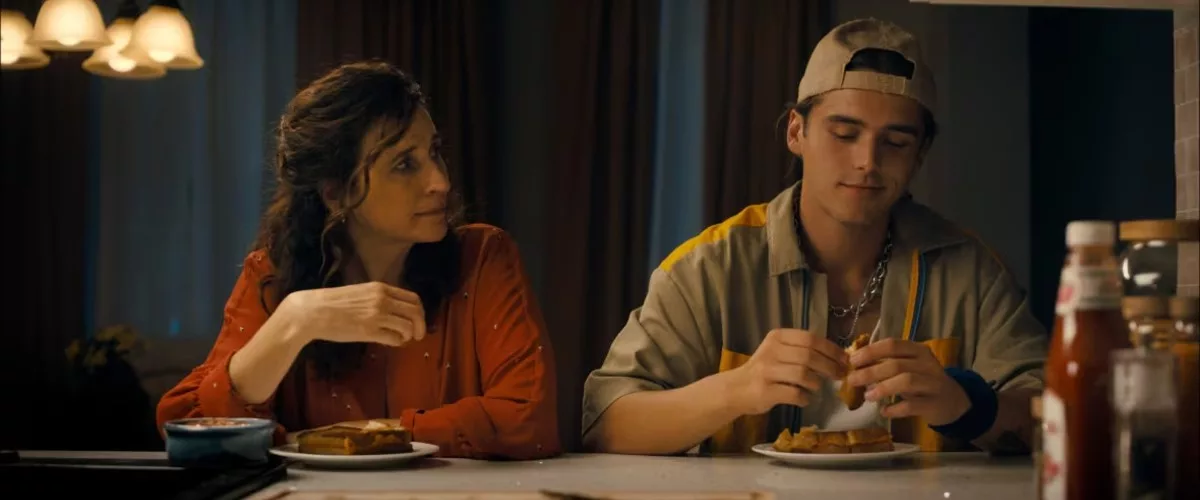“Suze” has a clear set-up. With the set-up comes moments of contrivance which can be spotted from the next block. But the film, co-directed and co-written by Dane Clark and Linsey Stewart, has an eccentric spirit and an individualistic streak underlined by the very human performances and a nuanced script filled with unexpected moments. All of this counter-acts the cliché and draws you into the characters’ world. If the most important things—performances, good writing, confident directing—are present, any potential cliché ceases to matter at all. Shakespeare used contrived set-ups, too.
Michaela Watkins plays Susan, a middle-aged woman whose life was derailed by her husband’s infidelity five years before. She’s been unable to get over it. She is still angry and resentful. Her ex-husband has moved on, marrying the mistress and apparently flourishing. Susan is perimenopausal, carrying around a portable fan for the hot flashes. “How long will this last?” she asks the doctor. “From four to ten years” is the daunting reply. Susan’s daughter Brooke (Sara Waisglass) is a bratty, entitled high school graduate on her way to Montreal for college. Brooke doesn’t hide her glee at getting out from under her needy mother’s thumb. To make things more tense, Susan can’t stand Brooke’s boyfriend, Gage (Charlie Gillespie). According to Susan, he flunked out of school, he’s in a band, his mother is a felon, he’s going nowhere fast, and Brooke is way too good for him.
But let’s take a closer look at Gage, because that’s what “Suze” is all about, taking a closer look at people you might be tempted to write off. Gage strolls around shirtless and is oblivious to Susan’s unkindness towards him. He is gregarious and friendly and calls Susan “Suze” in a blaze of inappropriate (yet sincere) familiarity. He is madly in love with Brooke and doesn’t play it cool. When Brooke walks across the stage in her cap and gown to receive her diploma, Gage stands up shouting, “Bay-beeee! That’s my GIRL!” throwing Suze a wild grin, like, “Aren’t we so proud of her?” Suze wants nothing to do with this. But it’s obvious: Suze isn’t really seeing Gage. (One of the sneaky revelations of “Suze” is that it’s not so much Gage isn’t good for Brooke; it’s that Brooke doesn’t deserve Gage.)
After Brooke’s departure to Montreal, Gage tries to commit suicide. Goofy, friendly waters often run deep. Suze reluctantly goes to visit Gage in the hospital. The contrivance of “Suze” comes when Gage’s uncaring dad, about to leave on a business trip, asks Suze to look after Gage during his absence. Suze is horrified, every molecule of her saying “Absolutely not,” and yet before she knows it, Gage is limping through her house, calling her “Suze” and pouring out his heart to her. Gage is oblivious to Suze’s obvious disinterest and disapproval.
The development of this intergenerational relationship unfolds in unexpected ways. It is not May-December like the Todd Haynes film. It doesn’t go in that direction, thankfully. This is more about two people who don’t know each other at all thrust into close proximity and find themselves changing, without even wanting to, or—in Suze’s case—against her will. She didn’t even realize how stuck she was. Gage is engaging and it’s sincere. He’s the opposite of manipulative. This is what Suze couldn’t see before. She brings him to work with her, and he says hello to everyone, stunning the conservative workforce with his gregarious positivity. When he stops going to work with her, a co-worker asks Suze if it’s all right if he keeps texting with Gage. Gage is a natural in connecting with other people.
Gage could have been manic-pixie-dream-boy material, but Gillespie’s depth and sensitivity as an actor keep Gage as an individual, a real person you could know in the world. Suze suddenly starts to see what’s going on. Nobody has looked out for him. Everyone underestimates him. His dad is a jerk. Brooke takes him for granted. This kid needs guidance and support. There’s something hopeful about this intergenerational dynamic: breaking down barriers into a space of mutual caring. Suze is not warm, and her behavior with Brooke is codependent. Brooke moves to Montreal and literally never calls her mother. Suze leaves increasingly desperate messages. Gage’s heart is broken when Brooke breaks up with him over text. Basically, both Suze and Gage need to “move on” from Brooke. How this all plays out is the welcome surprise of “Suze.”
A couple of loose threads could have used more development. Gage takes Suze to a cuddle party, which is funny in and of itself due to the sheer improbability of Suze being anywhere near such an environment. Tannis, the woman who leads the event, is played with such warmth and friendliness by Tricia Black that I hoped for more from her. Unfortunately, instead of exploring this intriguing sub-culture on its own terms, the scene is a blatant contrivance to set up a tentative dating possibility for Suze. The main event here is Suze and Gage, and once you invest in the characters, which happens pretty early on, anything that detracts is obvious.
Suze is visibly annoyed when Gage calls her “Suze.” It makes her skin crawl. Suze?? Who does this loser kid think he is? Stop presuming I like you. I do not like you. Suze is dead wrong about Gage. Gage has rock-hard abs, which he is not afraid to display, and he is also fragile and kind. Both are true. Accepting multiple things can be true at the same time, and being able to tolerate complexity makes human connection possible. John Keats called it “negative capability,” defining it as “capable of being in uncertainties, Mysteries, doubts, without any irritable reaching after fact and reason.”
If you’ve watched videos of butterflies breaking out of the chrysalis, you know it’s a violent and awkward process. Growth spurts are painful. Suze was cocooned for so long, and her growth was not easy. Ultimately, the message of “Suze” has universal resonance: it is wrong to write people off based on their appearance, lack of education, and generation. “Suze” doesn’t sentimentally make this point (the film avoids sentimentality altogether). “Suze” invests in its characters, allowing them complexity and ambiguities. Everyone is full of surprises. Like Tracy Lord says in “The Philadelphia Story”: “The time to make up your mind about people is never.”




















